| 1 |
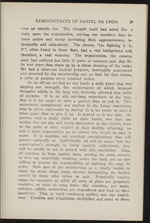 |
“...
We had a clean-cut tactical program, thoroughly understood
and accepted by the membership and we had, for that reason,
a unity of purpose never attained before.
As an off-set we had on our hands a daily paper that was
sapping our strength, the maintenance of which imposed
struggles which, in the long run, seriously affected that unity
of purpose. It is an old, age-long experience of the race,
that it is far easier to start a quarrel than to end it. Th^
experience, paraphrased and applied to the Labor movement,
may be given expression by saying: It is far easier to start a
labor paper than to give it up. It proved so in our case. As
parents with a sickly child on their hands, one that can
neither live nor die, will strain themselves to the utmost, even
to the point of utter neglect of their healthy offspring, so
will a labor organization go to almost any length to save a
paper. It is emotion, not practical considerations that will
governnaturally so. Individually, all will be aware that...”
|
|
| 2 |
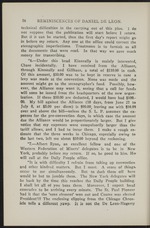 |
“...56 REMINISCENCES OF DANIEL DE LEON.
technical difficulties in the carrying out of this plan. 1 do
not suppose that the publication will start before 1 return.
But if it can be started, then the first days report might go
in before my return. Any one at the office could correct the
stenographic imperfections. Trautmann is to furnish us all
the documents that were read. In that way we save much
money for transcribing.
"6.Under this head Kinneally is mainly interested.
Chase incidentally. I have received from the Alliance,
through Kinneally and Gillhaus, a total of $110.00 in cash.
Of this amount, $10.00 was to be kept in reserve in case a
levy was made at the convention. None was made and the
amount might go to the stenographers fund. Possibly, how-
ever, the Alliance may want it, seeing that a call for funds
will soon be issued from the headquarters of the new organ-
ization. If these $10.00 are deducted, I would have had $100.-
00. My bill against the Alliance (18 days, from June 21 to...”
|
|
| 3 |
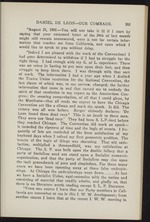 |
“...DANIEL DE LEONOUR COMRADE. lOJ
"August 21, 1905.You will not take it ill if I start by
saying that your esteemed letter of the 24th of last month
might still remain unanswered, were it not for certain infor-
mation that reaches me from California, and upon which I
would like to speak to you without delay.
Indeed I am pleased with the work of the Convention! I
had gone determined to withdraw if I had to struggle for the
right thing. I had enough with my K. of L. experience. There
was no sense in having to put men upon their feet, and then
struggle to keep them there. I was through with that sort
of work. The information I had a year ago when I drafted
the Trades Union resolution for the National Convention, the
ast clause of which was, to my sorrow, changed; the further
m ormation that came in and that caused me to embody the
spirit of that resolution in my report to the Amsterdam Con-
.gress; the seeming comprobation, of all that I could glean, by
the Manifestothat all made me expect to...”
|
|
| 4 |
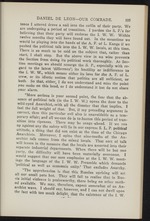 |
“...DANIEL DE LEONOUR COMRADE. 105
tence I uttered drove a nail into the coffin of their party. We
are undergoing a period of transition. I pardon the S. P.s for
believing that their party will endorse the I. W. W. Within
twelve months they will have found out. In the meantime we
would be playing into the hands of the A. F. of L. Kangs if we
pushed the political talk into the I. W. W. locals, at this time.
There IS so much to be said on the subject that, rather than
start I shall stop But the above view in no wise prevents
the Section from doing its political work thoroughly. At Sec-
tion meetings we should scourge the .S. P.. especially with re-
fh. T V hostility or indifference to
the I. W. W., which means either its love for .the A. F. of L
hlfr c a sufficient, or
oth. So that, either, I do not understand and miss the point
your*atarm ^ understand it but do not share
n serious is your second point, the fear that the ab-
sence of political talk (in the I. W. W.) opens the door to the
Tell...”
|
|
| 5 |
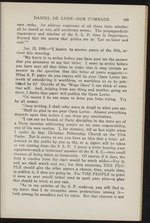 |
“...member addressing people on his own responsibility,
and of his own motion. I, for instance, did so last night when
I spoke m that Christian Fellowship Church on the VIth
rsalra But It seems to me you have an idea that a letter ad-
dressed to the public by you as the, or a, signer will be taken
as not coming from the S. L. P. I guess a letter bearing your
c'hTnce f notorious member of the N. E. C.-runs small
chances of being taken so innocently. Of course, if it does the
leM It reaches from the start would be much wider.Try it,
an we shall watch and see; but then meseems, THE PEO-
that sTouTd beliI3,'alaTyratr'^
y letter that I do recognize some proletarians among it-
oth among its members and its votes. But that element is not...”
|
|
| 6 |
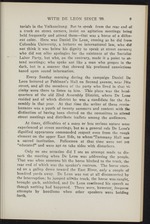 |
“...meetings, but as a general rule De Leon#
dignified appearance commanded respect even from the roug%
element on the upper East Side, to whom "Tammany Hall wa*
a sacred institution. Policemen at that time were not yet
educated and were apt -to take sides with disturbers.
Only on one occasion did I see an attempt made to dis-
turb the meeting when De Leon was addressing the people.
That was when someone hit the horse hitehed to the truck, the
rear end of which was the speakers rostrum. The horse start-
ed on a gallop down toward the East River, only a couple of
hundred yards away. De Leon was not at all disconcerted by
the interruption; he jumped off the truck, the horse was caught
brought gack, unhitched, and De Leon comtinued his speech as
though nothing had happened. There were, however, frequent
attempts by hoodlums when other speakers were holding
forth....”
|
|
| 7 |
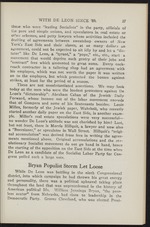 |
“...WITH DE LEON SINCE 89. 37
thoie who were leading Socialists in the party, officials of
t..e pure and simple unions, and speculators in real estate or
other schemes, and petty lawyers whose activities included the
dratling of agreements between sweatshop owners of New
York's East Side and their slaves, at so many dollars an
agieement, could not be expected to sit idly by and let a "dic-
tator like De Leon, a tyrant, a pope, etc., etc., start a
movement that would deprive such gentry of their jobs and
"contract fees which amounted to great sums. Every cock-
roach contractor in a tailoring shop had an agreement with
his employes, which was not worth the paper it was written
on to the employes, but which protected the bosses against
strikes, at least for the period of a season.
These are not unsubstantiated assertions. We may look
today at the men who were the loudest protestors against De
Leons "dictatorship: Abraham Cahan of the Jewish Daily
Forward, whose income out of the labor movement...”
|
|
| 8 |
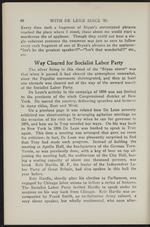 |
“...40 WITH DE LEON SINCE 89.
Every time such a fragment of Bryans stereotyped phrases
reached the place where I stood, those about me would start a
murderous din of applause. Though they could not hear a sin-
gle coherent sentence the comment was just as sure to follow
every such fragment of one of Bryans phrases as the applause:
Isnt he the greatest speaker!!Isnt that wonderful!! etc.,
etc.
Way Cleared for Socialist Labor Party
The silver lining in this cloud of the Bryan storm was
that when it passed it had cleared the atmosphere somewhat,
since the Populist movement disintegrated, and thus at least
one obstacle was cleared out of the way of the onward march
of the Socialist Labor Party.
De Leons activity in the campaign of 1896 was not limited
to the precincts of the ninth Congressional district of New
York. He toured the country, delivering speeches and lectures
in many cities, East and West.
On a previous page it was related how De Leon severely
criticized our shortcomings in arranging...”
|
|
| 9 |
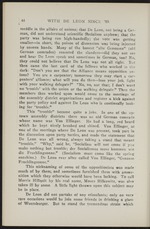 |
“...was being run high-handedly; the vote was getting
smaller in short, the poison of dissension was being injected
by unseen hands. Many of the honest alte Genossen (old
German comrades) resented the slandersdid they not see
and hear Do Leon speak and sometimes in German, too? No,
they could not believe that De Leon was not all right. But
then came the last card of the fellows who worked in the
dark: Dont you see that the Alliance means opposition un-
ions? You are a carpenter; tomorrow they may .start a car-
penters alliance: what will you do thenlose your job, fight
! with your walking delegate? No, no, not that; I dont want
no trooble with the union or the walking delegate. Then the
members thus worked upon would come to the meetings of
the assembly district organizations and register a kick against
the party policy and against De Leon who is continually look-
ing for trooble.
This trooble became quite a joke. In one of the up-
town assembly districts there was an old German comrade
whose...”
|
|
| 10 |
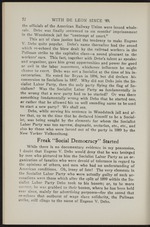 |
“...choose to exert. Debs was not a Socialist at the time of his in-
carceration. He voted for Bryan in 1896, but did declare his
conversion to Socialism in 1897. Why did not Debs join the So-
cialist Labor Party, then the only party flying the flag of So-
cialism? Was the Socialist Labor Party so fundamentally in
the wrong that a new party had to be started? Or was there
something fundamentally wrong with Debs that he started one,
or rather that he allowed his so well sounding name to be used
to start a new party? We shall see.
Debs, while serving his sentence in Woodstock jail and af-
ter that, up to the time that he declared himself to be a Social-
ist, was being sought by the elements for whom the Socialist
Labor Party was too narrow, dogmatic, sectarian, etc., etc., and
also by those who were forced out of the party in 1889 by the
New Yorker Volkszeitung.
Freak Social Democracy Started
While there is no documentary evidence in my possession,
I doubt that Eugene V. Debs would deny that he...”
|
|
| 11 |
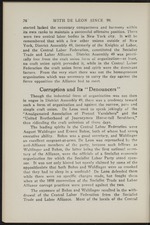 |
“...two central labor bodies in New York city. It will be
remembered that with a few other unions outside of New
York, District Assembly 49, formerly of the Knights of Labor,
and the Central Labor Federation, constituted the Socialist
Trade and Labor Alliance. District Assembly 49 was practi-
cally free from the craft union form of organizationat least,
no craft union spirit pervaded it, while in the Central Labor
Federation the craft union form and spirit were the dominant
factors. From the very start there was not the homogeneous
organization which was necessary to carry the day against the
fierce opposition the Alliance had to meet.
Corruption and Ita Denouncers
Though the industrial form of organization was not then
in vogue in District Assembly 49, there was a tendency toward
such a form of organization and against the narrow, pure and
simple craft union. De Leon used to speak jokingly of the
Amalgamated Association of Pretzel Varnishers and the
United Brotherhood of Journeymen Horse-tail...”
|
|
| 12 |
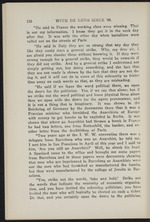 |
“...136
WITH DE LEON SINCE 89.
He said in France the working class were winning. That
is not my information. I know they get it in the neck day
after day. It was only the other day when battalions were
called out on the streets of Paris,
He said in Italy they are so strong that any day they
like they could start a general strike. Why, my dear sir, I
am afraid you slander them without knowing it. If they were
strong enough for a general strike, they would be cowards if
they did not strike. And by a general strike I understand not
simply getting out, but doing something, and the fact that
they are not ready is shown by the fact that they are not do-
ing it, and it will not do in cases of this solemnity to fritter
time away on such words as that, as they are misleading.
He said if we leave the word political there, we open
the doors for the politician. Yes, if we say that alone; but if
we strike out the word political and leave physical force alone
then we open wide the doors for the agent provocateur...”
|
|
| 13 |
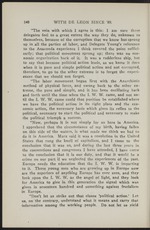 |
“...forget the experi-
ences that we should not forget.
"The labor movement began first with the Anarchistic
method of physical force, and swung back to the other ex-
treme, the pure and simple, and it has been Oscillating back
and forth until the time when the I. W. W. came, and not un-
til the I. W. W. came could that position be established where
we have the political action in its right place and the eco-
nomic action, the necessary basis which gives its reflex to the
political, necessary to start the political and necessary to make
the political triumph a success.
"Now, perhaps it is not simply for us here in America.
I apprehend that the circumstance of my birth, having fallen
on this side of the waters, is what made me think we had to
do it in America. Marx said it was a revolution in the United
States that rung the knell of capitalism, and I came to the
conclusion that it was so, and during the last three years in
the conventions and congresses I have attended, I have come
to the conclusion...”
|
|
